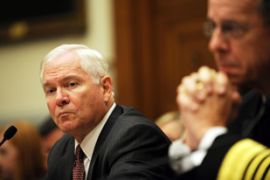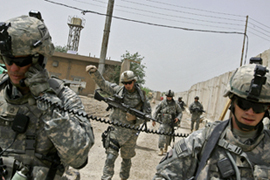US sees ‘endgame’ in Iraq
Defence secretary urges caution on troop levels ahead of redeployment to Afghanistan.

Afghanistan focus
While the Bush administration has said that Iraqi security has improved in recent months, US and Nato forces in Afghanistan are facing increasingly frequent attacks from fighters linked to the Taliban and al-Qaeda.
“I am not convinced we are winning yet in Afghanistan but I am convinced we can,” Mullen said.
“That is why I intend to commission and am looking at a more comprehensive military strategy for the region that covers both sides of that border.”
But Mullen said that Afghanistan needs more than just “boots on the ground”.
“It needs more trucks on the roads, teachers in schools, trained judges and lawyers in courts, foreign investments, alternative crops, sound governance, the rule of law – these are the keys to success in Afghanistan,” he said.
“We cannot kill our way to victory.”
Caution advised
The US military is working with Pakistan’s government in an attempt to crack down on Taliban and al-Qaeda linked fighters who are believed to be based in Pakistan’s border region with Afghanistan, Gates said.
 |
| The US says Iraqi security has improved but remains fragile [AFP] |
“I do believe that Islamabad appreciates the magnitude of the threat from the tribal areas, particularly the uptake in suicide bombings directed against Pakistani targets,” he said.
“During this time of political turmoil in Pakistan it is especially critical that we maintain a strong and positive relationship with the government, since any deterioration would be a setback for Afghanistan and Pakistan,” he said.
“The war on terror started in this region and must end there.”
However, Gates said that Iraqi security was still fragile and warned that the situation could deteriorate unless there is continued diligence on the security front.
Improvements to security in Iraq could have “the potential of overriding a measure of caution borne of uncertainty,” he said.
“The planned [US troop] reductions are an acceptable risk today that also provide for unforeseen circumstances in the future,” he said.
“The reductions also preserve a broad range of options for the next commander-in-chief who will make his own assessment after taking office in January,” he said.
“As we proceed deeper into the endgame, I would urge our leaders to implement strategies that while steadily reducing our presence in Iraq also take into account the advice of our commanders,” he said.